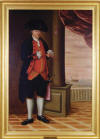
|
_____________ This "raiders" division of the Gaspee. Info website is devoted to information about the Raiders as individuals.
In this section of
Go to _____________ Books: American Colonial and
Revolutionary War history or the people involved. We have suggestions
for you.
Copyrighted.
© 2005
to
03/17/2010
Leonard H. Bucklin.
-----
The
content of this site may not be reproduced except for brief excerpts for
reviews or scholarly references..
_____________
This is a history education and
research web site of the
|
Capt. Abr.Whipple led the Americans' first open, armed opposition to British forces by capturing and destruction of the English Navy ship Gaspee on June 10th, 1772. Although others organized the expedition, he was in charge of the flotilla of longboats attacking the Gaspee.Whipple was later a Commodore in the U.S. Navy during the American Revolution. He was one of the most successful of the navel officers of the Navy of the United States.
Several Bucklins were married to Whipples in the period of 1730-1800. The
Whipple genealogy at
www.whipple.org/docs/genealogy.html
The Joseph Bucklin (1742) who married Amy Whipple was the first cousin once removed of the Joseph Bucklin 5th of Gaspee raider fame. This Joseph (1742) and Amey certainly wanted to commemorate their combined family names. Their children were named:
From the point of view of the Bucklin family, it is interesting that the Commodore is a descendent of Captain John Whipple (abt 1617-16 May 1685) The first Whipple in America, John came from Dorchester, England, and arrived in Dorchester (part of present-day Boston), Massachusetts Bay Colonyt, in about 1632, at the age of 17, aboard the ship Lyon. He was a housewright in Dorchester. In 1658 his family moved to Providence, where he lived the remainder of his life. This parallels in many ways the Bucklin family, which started in American with William Bucklin who lived in England in the Dorchester area, came to Hingham (part of present-day Boston) in 1634, where he was a housewright, and moved to the Providence area in about 1645. In short, the Whipple and the Bucklin in the Gaspee raiding party had family backgrounds that were similar and also connected, as noted above. See Abraham Whipple biography (Link courtesy of Whipple.org) Abraham Whipple's wife, Sarah Hopkins, was a niece (daughter of a brother William ) of Stephen Hopkins (1707-1785) an often governor of Rhode Island and Chief Justice at the time of the Gaspee attack. After Lexington/Concord, the Rhode Island General Assembly, spurred on by the prodding's of leading sea merchant John Brown, directed the committee of safety to charter two vessels to protect the trade of Newport. Thus was formed (on June 12, 1775,) the Rhode Island Navy, the first American Navy of the Revolution. Brown chartered one of his sloops, the Katy, to the infant Navy; and Abraham Whipple, as one of Brown’s leading captains was invested with the command of the Katy and a smaller vessel, the Washington. On June 15th Whipple received his Rhode Island appointment assignment to clear Narragansett Bay of the English Navy ships used in the flotilla headed by the British frigate Rose then off Newport. On that first day of his appointment he discharged this duty by attacking one of those English ships, the armed sloop Diana. Click Here to read the other half of the story on how Brown "just happened" to have ships and men ready for this new navy. Thus Whipple fired the first cannon fired at any part of His Majesty’s Navy in the Revolutionary struggle. The Katy’s fire power was vastly greater than the Diana, so after half an hour the British abandoned the Diana on the rocks off Conanicut Island (present day Jamestown, Rhode Island) and the Americans suffered no casualties. Whipple towed the Diana back to Providence. When the British frigate Rose, commanded by Sir James Wallace, sailed up the Bay to Providence to investigate what had happened to the Diana, Newport citizens, now unhindered by the presence of the Rose in their harbor, were able to recapture five out of the six Newport merchant ships that Wallace had previously confiscated and anchored in the harbor. So ended the first naval battle of the Revolution, with the English losing six ships. Whipple's Katy was ill-equipped to come to grips with the much better armed Rose, and Whipple knew that. He instead seized other opportunities when they presented themselves. One of these incidents further specially provoked Wallace. While the Rose was absent on one of her many foraging expeditions, this time to Fisher’s Island, Commodore Whipple boldly sailed into Newport Harbor and loaded all the remaining cannon from Fort George, Newport Habor, aboard the Katy and transported them to Providence for the use of the Continental forces. In return the exasperated commander of the Rose, Captain Wallace, wrote a note to Whipple.
To which note, Whipple replied with equal brevity:
Captain Wallace's reference to the Gaspee event from three years past is of interest. Apparently Captain Wallace knew the information that his admiral, Admiral Montague, had received from a Rhode Island spy regarding Rhode Island participants in the Gaspee destruction. During the War, Admiral Montaque never disclosed the existence of his well-placed spy, although the non-disclosure also meant he could not publically state the military knew in 1772 facts that the official Royal Commission was never able to determine in 1772-1773.
|


